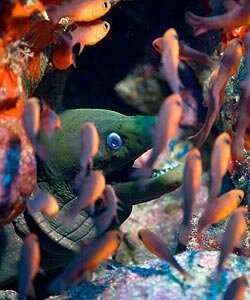Most deep sea fisheries are unsustainable and should be closed, a new report says.
The call comes after a 25-year-long marine study revealed that commercial fishing in the north-east Atlantic could be damaging species at much greater depths than previously believed.

Moray eel - the study found numbers of one species of eel were down by half
Numbers of deep-water species living a kilometre below the reach of trawlers are apparently being affected by fishing practices, the new study found.
Although scientists have known that commercial fishing does affect deep-water fish populations they have now discovered it is occuring at much greater depths.
Populations of north-east Atlantic commercial deep-water fish such as black scabbardfish, orange roughy and roundnose grenadier have dwindled since deep-water fishing started in the area in the late 1980s but a quota system wasn’t introduced until 2003.
Dr David Bailey of the University of Glasgow, who led the study, published in the journal Proceedings of the Royal Society B, said:
“Commercial fishing may have wider effects than anyone previously thought, affecting fish which we assumed were safely beyond the range of fishing boats. We were extremely surprised by this result and believe that it has important implications for how we manage the oceans.”
Deep-water fish living off the west coast of Ireland were monitored by Natural Environment Research Council-owned ships from 1977 until 1989 before any fishery was operating in the region.
Researchers checked the same area again from 1997 until 2002 using exactly the same methods and the results were then compared as part of an EU-led project to study deep-sea species. Continue reading ‘Deep sea fish suffer far greater damage than was first thought’
![]()


